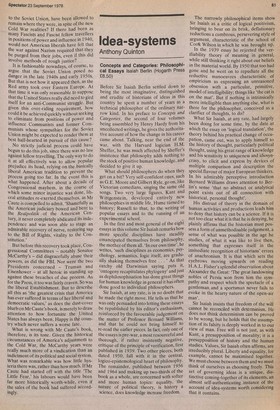Idea-systems
Anthony Quinton
Concepts and Categories: Philosophical Essays Isaiah Berlin (Hogarth Press £8.50) Before Sir Isaiah Berlin settled down to being the most imaginative, distinguished and erudite of historians of ideas in this country he spent a number of years as a technical philosopher of the ordinary narrow kind. In his preface to Concepts and Categories, the second of four volumes being assembled by Henry Hardy from his uncollected writings, he gives the authoritative account of how the change in his career came about. Talking, near the end of the war, with the Harvard logician H.M. Sheffer, he was much affected by Sheffer's insistence that philosophy adds nothing to the stock of positive human knowledge, and decided to give it up. What should philosophers do when they get on a bit? Very self-confident ones, such as G.E. Moore and Gilbert Ryle, go on, like Victorian comedians, singing the same old songs. Two very large figures, Kant and Wittgenstein, developed entirely new philosophies in middle life, Hume tnnied to history; Russell to that, to the writing of popular essays and to the running of an experimental school. In the first and most general of the eight essays in this volume Sir Isaiah remarks how more specific disciplines have steadily emancipated themselves from philosophy, the mother of them all. 'In our own time', he writes, 'such disciplines as economics, psychology, semantics, logic itself, are gradu ally shaking themselves free . ' As that catchy old Darwinian saying puts it, `ontogeny recapitulates phylogeny' and just as dephilosophisation has done great things for human knowledge in general it has often done good to individual philosophers. Sir Isaiah, at any rate, is in no doubt that he made the right move. He tells us that he was only persuaded into letting these essays be republished by his editor's enthusiasm, reinforced by the favourable judgement on the matter of Professor Bernard Williams. and that he could not bring himself to re-read the earlier pieces. In fact, only one of the essays is pre-war, a most resourceful and thorough, if rather insistently negative, critique of the principle of verification, first published in 1939. Two other pieces, both dated 1950, fall with it in the central, logico-epistemological heart of philosophy. The remainder, published between 1956 and 1964 and making up two-thirds of the book as a whole, are concerned with softer and more human topics: equality, the nature of political theory, is history a science, does knowledge increase freedom. The narrowly philosophical items show Sir Isaiah as a critic of logical positivism, bringing to bear on its brisk, deflationary reductions a cumbrous, persevering style of argument, characteristic of the school of Coot Wilson in which he was brought up. In the 1939 essay he rejected the verifiability theory of meaning in general, while still thinking it right about our beliefs in the material world. By 1950 that too had gone and he went on to repudiate all the reductive manoeuvres characteristic of empiricism as expressing an unreasoned obsession with a pariicular, primitive, model of intelligibility: things like 'the cat is on the mat'. But if nothing is intrinsically more intelligible than anything else, what is there for the philosopher, conceived as a clarifier of thoughts, to do?
What Sir Isaiah, at any rate, had largely been doing for some time, by the date at which the essay on 'logical translation', the theory behind his practical change of occupation, came out, was to apply himself to the history of thought, particularly political thought, using his great range of knowledge and his sensitivity to uniqueness and idiosyncrasy, to elicit and express by devices of multiple comparison and description the special flavour of major European thinkers. In his admirably perceptive introduction Bernard Williams draws attention to Berlin's sense 'that no abstract or analytical point exists out of all connection with historical, personal thought'.
His distrust of theory in the domain of human activities and productions leads him to deny that history can be a science. If it is not too clear what it is that he is denying, he plainly affirms that the historian must possess a form of unmethodisable judgement, a sense of what was possible in the age he studies, of what it was like to live then, something that expresses itself in the immediate recognition of historians' errors of anachronism. It is that which sets the eyebrows moving upwards on reading 1-I.A.L. Fisher's splendid observation about Alexander the Great: 'The great landowning nobles of Persia won from him the sympathy and respect which the spectacle of a gentleman and a sportsman never fails to evoke in the hearty nature of the open-air man'.
Sir Isaiah insists that freedom of the will cannot be reconciled with determinism. He does not think determinism can be proved to be wrong, but he holds that the assumption of its falsity is deeply worked in to our view of man. Free will is not just, as with Kant, a presupposition of morality; it is a presupposition of history and the human studies. Values, Sir Isaiah often affirms, are irreducibly plural. Liberty and equality, for example, cannot be maximised together. We must choose between them and we must think of ourselves as choosing freely. This set of governing ideas is a unique, distinctive coming-together of its elements, an almost self-authenticating instance of the account of idea-systems worth considering that it contains.


































































































 Previous page
Previous page